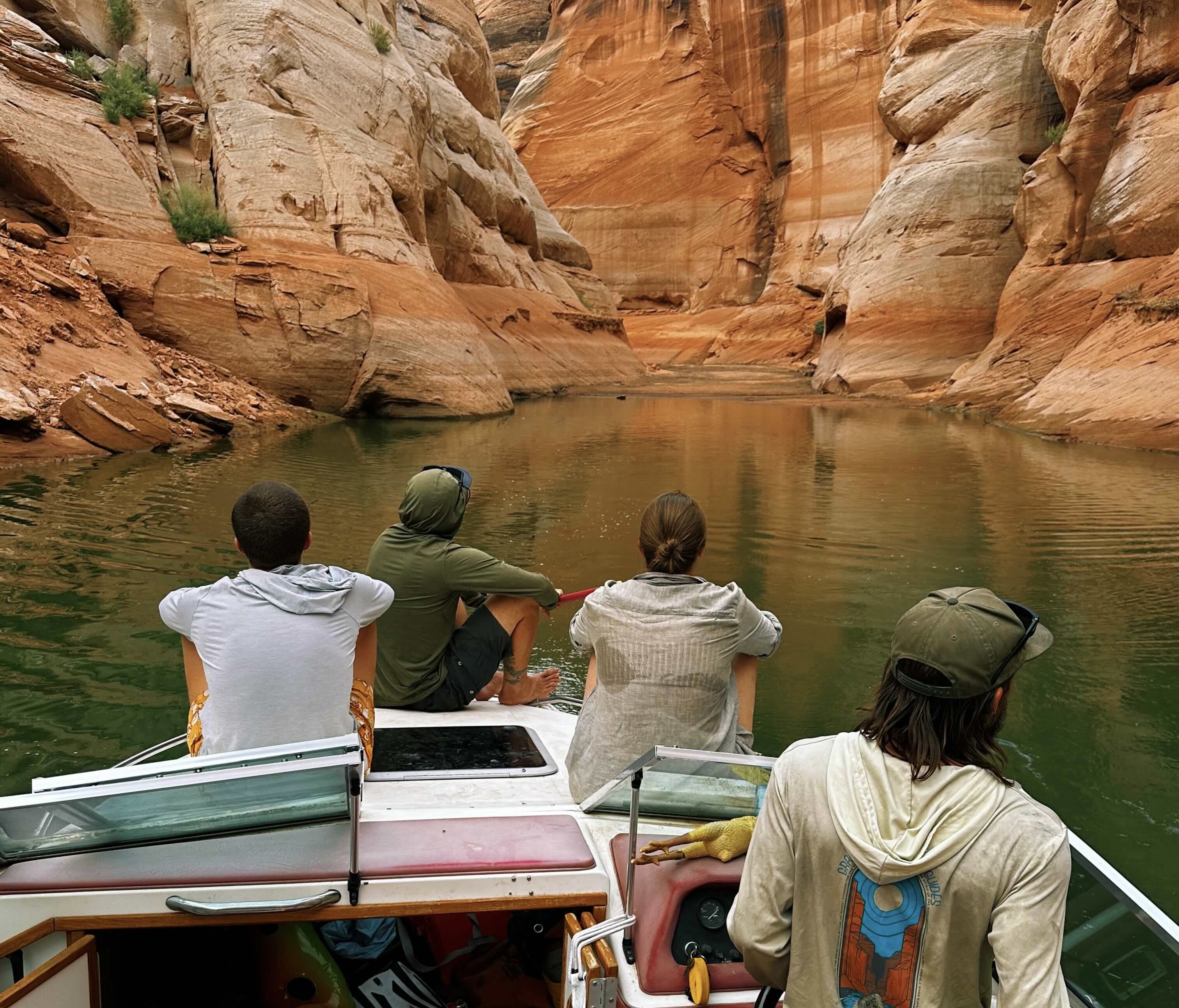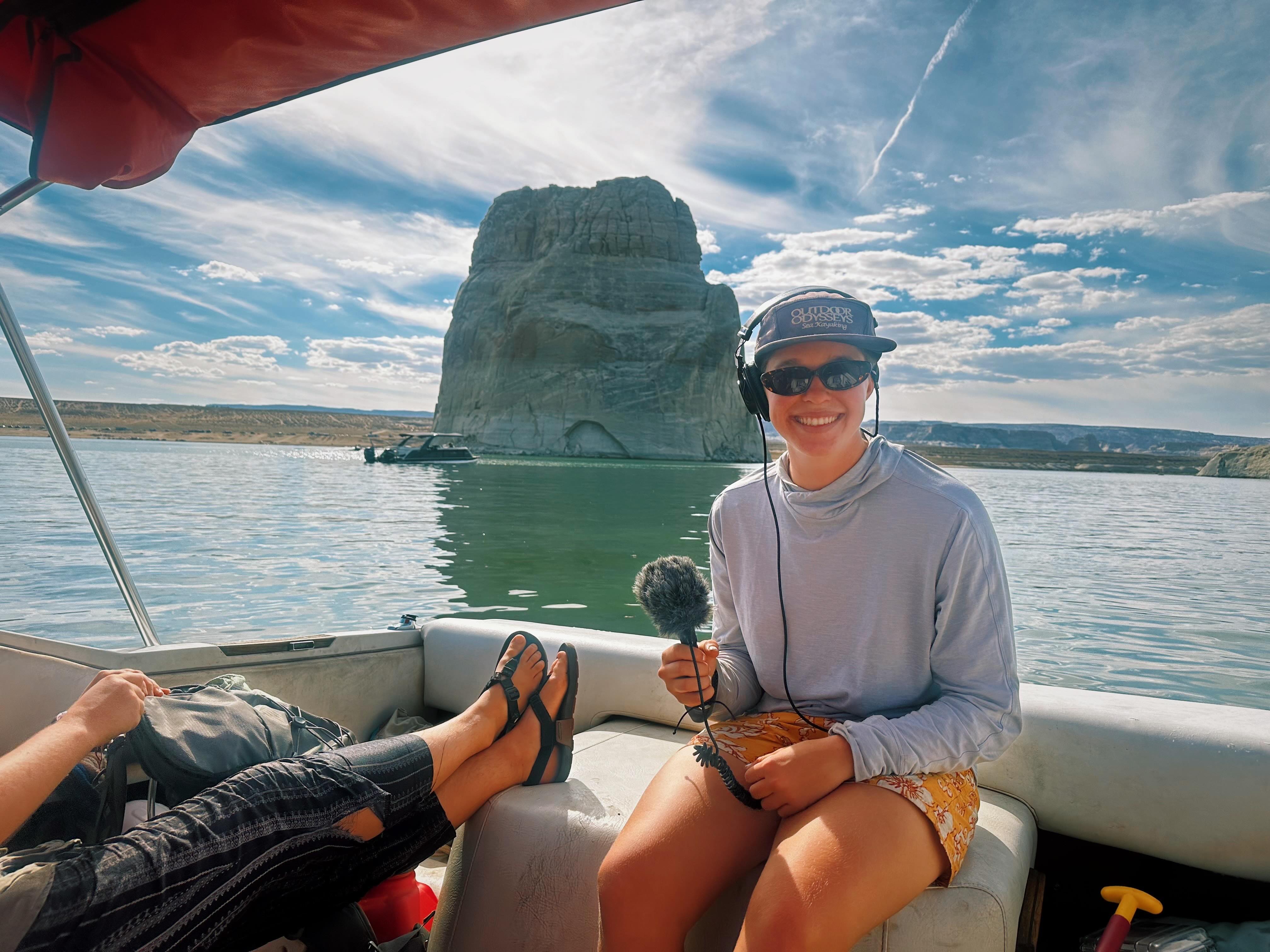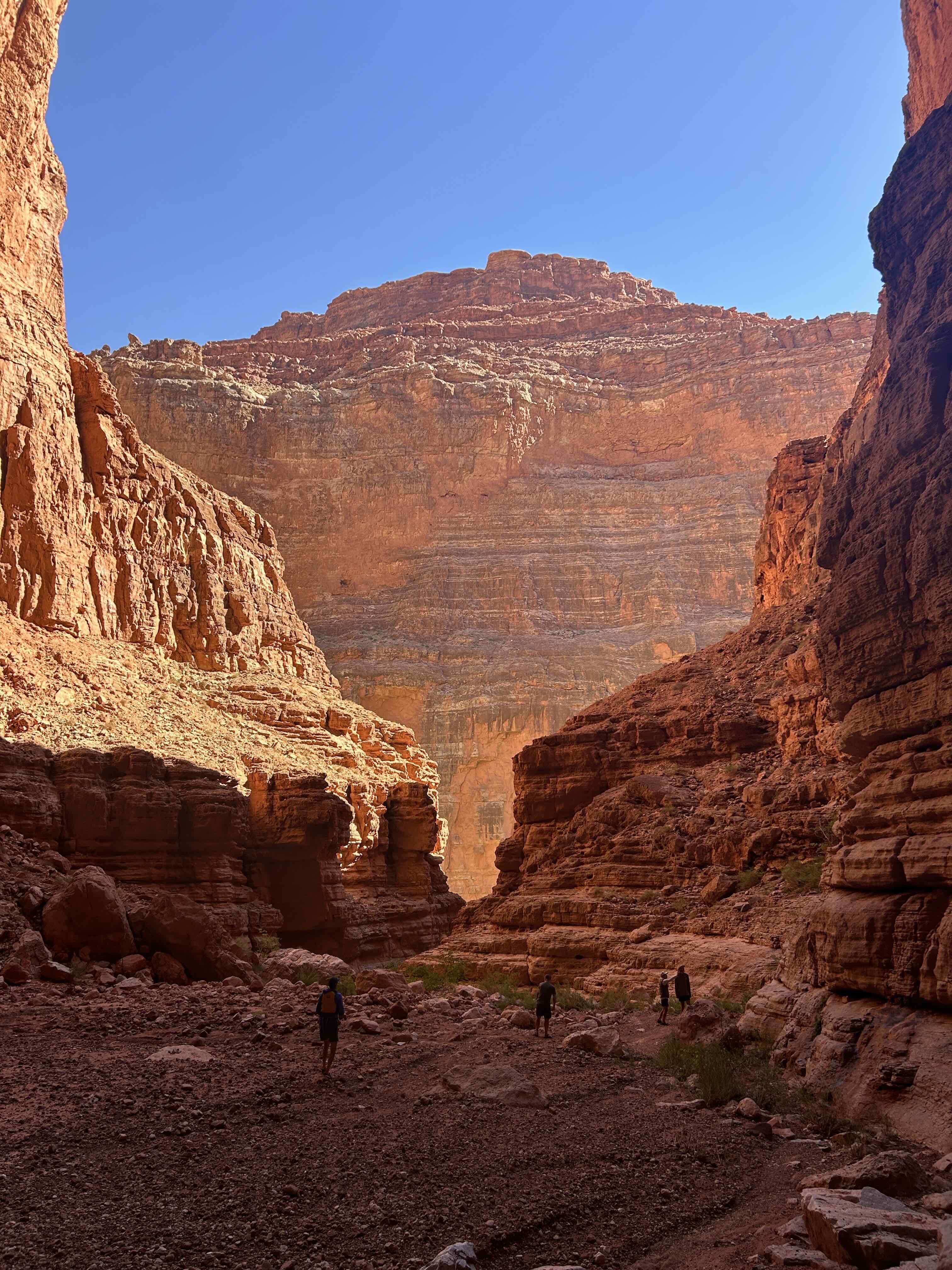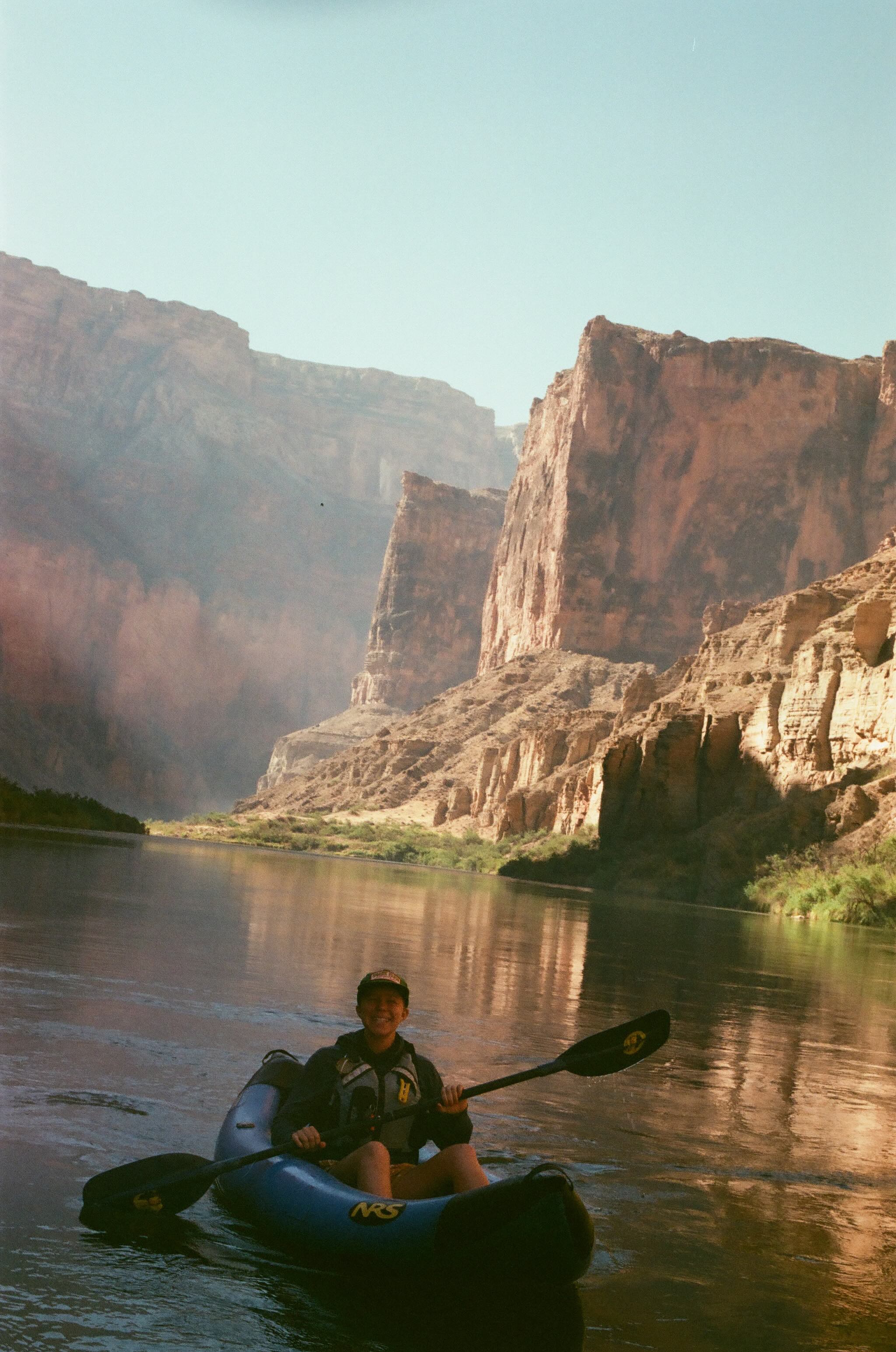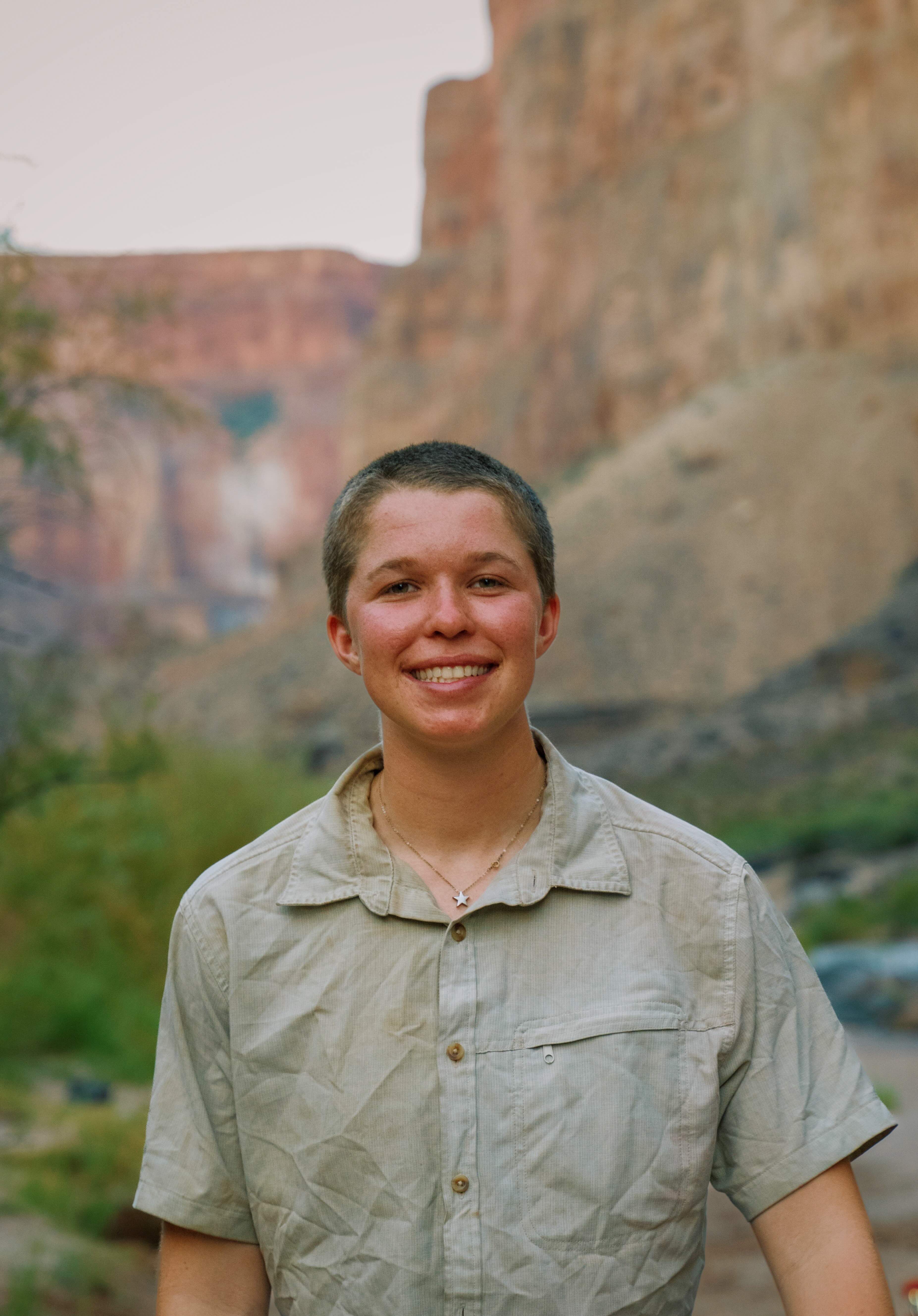A recent graduate who majored in Southwest Studies and minored in Environmental Studies has put their degree to use by producing a six-part podcast, Lifeblood: Glen Canyon, Lake Powell, and the Future of the Colorado River.
As part of their Senior Capstone Project, Evelyn Baher-Murphy ’25 (they/them) spent over two months traveling around the Colorado River Basin to learn about the river and the people it impacts. They interviewed stakeholders about the past, present, and what they say is the uncertain future of the Colorado River, a resource on which 40 million people depend. As part of their field research, they spent a week on the water with Lake Powell boaters, as well as several weeks rafting through the Grand Canyon.
“I learned so, so, so much from this experience,” says Baher-Murphy. “About interviewing, storytelling, and of course about the river itself. It felt like I got to be in the Block class of my dreams around a subject I designed with 30 of the most qualified guest speakers in the space. Because I wanted to focus on Glen Canyon Dam, I knew it was important for me and my ability to speak about the place to visit the dam, Lake Powell, and the river above and below the dam. Place-based learning is a huge part of Southwest Studies, and I knew being on site was the best way for me to understand the discourse, especially between groups who have very different visions for the future of Lake Powell.”
Baher-Murphy completed most of the research in Fall 2024. They used Block 2 to travel around Colorado, Utah, and Arizona where they interviewed experts and stakeholders and spent a night rafting Westwater Canyon and interviewed the owners and guides at Colorado River and Trail Expeditions. In Block 3 they spent 21 days rafting through the Grand Canyon, where they conducted additional interviews and learned more about the geology.
Baher-Murphy grew up in California during a decade-long drought, so they have always had an appreciation for water scarcity in the west. They developed a love for whitewater rafting over the past few years and after spending time floating and camping alongside major western rivers, they realized the myriads of environmental issues facing western rivers and the species that rely on them.
“In my academic career at CC, I found that I am fascinated by how water determines the shape of our societies and how we, in turn, shape water, controlling how and when it flows,” says Baher-Murphy, who now works as a paraprofessional in the Anthropology Department. “In the West, we manage water heavily. In fact, the Colorado River basin is known by some as the most managed river system in the world. Every drop of water is accounted for, and every drop of water is used before the river even reaches the sea. At the same time, we are seeing major changes to water infrastructure. More dams are being removed than are being built.”
Baher-Murphy was curious how dam removal trends map onto the Colorado River basin, and ultimately decided to focus on the Glen Canyon Dam for their research. “Glen Canyon Dam historically was criticized by environmentalists of the ‘60s and ‘70s and continues to face criticism today as the Megadrought has revealed infrastructure issues at the dam that make the entire Colorado River management system at risk of failure,” they say. “I was curious about what future stakeholders in the basin imagine for Glen Canyon Dam and how they think that future may become a reality.”
Baher-Murphy knew that they wanted to hear from people within the houseboating community, so they went to Antelope Point Marina, which is one of the marinas on Lake Powell. There, they saw a man getting back to the dock on his dinghy and asked to speak with him.
“He was incredibly friendly and said I had to talk to the ‘mayor’ of the cruiser doc, who is a man named Doug,” Baher-Murphy says. “Doug has had a slip on the cruiser doc for over 20 years. Doug introduced me to what he called the ‘cruiser doc family,’ which includes all the other boaters on that particular dock. The family really took me in. I was surprised to find myself getting tours of five-story, $5 million houseboats with helipads on the roof, and journeying up-lake with crypto billionaires from Salt Lake City who had flown in on their private jet.”
During their time with these boaters, Baher-Murphy learned that the lake is a fascinating landscape whose level is changing all the time, which means each season of boating reveals different parts of the canyon walls.
“At the same time, seeing the sheer amount of wealth in that marina, coupled with the deep love the cruiser dock family has for the lake, was incredibly illuminating and really complicated a lot of the perspectives I had heard prior,” Baher-Murphy says. “I am honestly still processing that experience.”
After finishing the research in fall 2024, Baher-Murphy took two blocks off in Spring 2025, their last semester on campus, to write the podcast scripts and begin producing the episodes. During that time, Baher-Murphy was predominantly working with their main advisor on the project, Dr. Steven Hayward, Professor of English and Director of the Journalism Institute. They were able to finish five scripts and the full production of three of the six podcast episodes during this time
Baher-Murphy’s time at CC deeply inspired this project. Their classes, Waters of the West, Environmental Policy and Politics, Archaeology of the Southwest, and Radio Journalism, all taught them skills they used each day while researching, interviewing people, and working on the podcast itself.
“Using the skills I learned in Radio Journalism to research an important environmental issue in the Southwest was truly a dream combination of some of my favorite coursework at Colorado College,” they say.
Baher-Murphy is incredibly grateful to their advisors, Dr. Santiago Guerra, Dr. Eric Perramond, and Hayward for their help in advising the project throughout the research and production process, as well as to all the faculty and staff members within the Southwest Studies Department.
The first episode, “The Colorado River: A River Run Dry,” was released on Aug. 22 and includes interviews with several experts in the field, including Colorado Riverkeeper and Co-founder of Living Rivers John Weisheit, Executive Director at Glen Canyon Institute Eric Balken, and Utah Geological Survey geologist Adam Hiscock. The second episode, “Imaginary Hydrologies: The Colorado River Compact,” which focuses on the Colorado River Compact and the three errors that were made it when it was signed and the third episode, “Glen Canyon: A Cathedral Drowned,” which elaborates on the construction of Glen Canyon Dam, and the subsequent flooding of Glen Canyon were released last month.
Both episodes include interviews with more experts, including Tribal Water lawyer Jay Weiner and Southwest Communications Director Sinjin Eberle, who spoke in the second episode, and Senior Water and Climate Research Scientist Bradley Udall and Founder of Colorado River and Trail Expeditions Vicki McKay, who were featured in the third episode.
The fourth episode, “Deadpool: Black Lights at the Crime Scene,” focuses on the risks of Deadpool, which is the point where the water level at Glen Canyon Dam may no longer be able to provide water to the Colorado River, resulting in potential water loss for people in Nevada, Arizona, California, and Mexico.
The fifth episode, “Tempered Hope: A Canyon's Return,” released this week, centers the mythology of Glen Canyon and the native habitats and archaeological sites that are re-emerging, and includes an interview Cultural Anthropologist for the Navajo Nation Erik Stanfield.
“I am really proud to be finally releasing the series,” Baher-Murphy says. “It is by far the most time I have put into any project, and it has been so rewarding to get to work with organizations I really look up to as partners in creating and promoting the series. This story is important because 40 million people rely on the river for water, and it is used to produce a huge portion of our nation's agriculture as well.”
Baher-Murphy cautions that some of the public doesn’t think about where their water comes from. For example, they say, even though the Colorado River is on the other side of the continental divide from Colorado Springs, people in Colorado Springs drink water from the Colorado River. “So, I hope the podcast encourages people to think about where their water comes from and reminds them that we all have a role to play and protecting the resources that sustain us,” Baher-Murphy adds.
Lifeblood: Glen Canyon, Lake Powell, and the Future of the Colorado River is available on both Apple Podcasts and Spotify.

